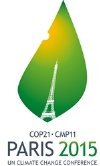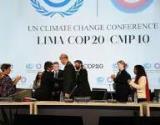Malaysia
Integrating the SDGs into National Development Plans This report looks at the incorporation of the 2030 Agenda and the SDGs into the national development plan-- Eleventh Malaysia Plan 2016-2020 –and asks whether Malaysia’s approach to the SDGs will demonstrate the same neoliberal biases, aims and agenda of all development plans since 2009. Will it belie the same fetishes for GDP or market/corporate stratagems instead of real socio-economic development plans? Does it package structural adjustment and austerity plans in the guise of ‘rationalizing’ and ‘integrating’ limited resources, funding and collaborative programmes? Will the imaginary crisis of a ‘middle-income trap’ continue to occupy the policy agenda, as opposed to the real crisis of the increasing income divide between the few who have and the many who have not?
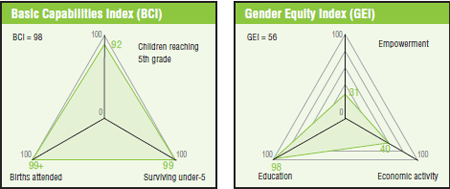
Published on Mon, 2020-05-11 11:02
The Coronavirus Global Response pledging event on 4 May celebrated raising 7.4 billion euro for the collaborative development of vaccines, treatment and diagnostics, but there is lack of clarity on ensuring equitable access and the role of the World Health Organization (WHO).
The European Commission pledged 1.4 billion euro, while other leading contributors included France (510 million euro), Germany (525 million), Japan (762 million), Spain (125 million), Canada (551 million), Norway (188 million), UK (441 million) and Italy (71.5 million). The USA was conspicuously absent.
|
Published on Fri, 2020-03-27 08:50
The United Nations Secretary-General Antonio Guterres on 25 March launched a US$2 billion coordinated global humanitarian response plan to fund the fight against COVID-19 across South America, Africa, the Middle East and Asia.
The launch was held virtually in UN headquarters in New York, with the Secretary-General being joined by the UN Under-Secretary-General for Humanitarian Affairs Mark Lowcock, WHO Director-General Dr. Tedros Adhanom Ghebreyesus, and UNICEF Executive Director Henrietta Fore.
According to the UN, COVID-19 has killed more than 16,000 people worldwide, and there are nearly 400,000 reported cases.
|
Published on Fri, 2016-08-12 18:56
The incorporation of the 2030 Agenda and the SDGs into the national development plan-- Eleventh Malaysia Plan 2016-2020 –and Malaysia’s approach to the SDGs demonstrate the same neoliberal biases, aims and agenda of all development plans since 2009. Will it belie the same fetishes for GDP or market/corporate stratagems instead of real socio-economic development plans? Does it package structural adjustment and austerity plans in the guise of ‘rationalizing’ and ‘integrating’ limited resources, funding and collaborative programmes? Will the imaginary crisis of a ‘middle-income trap’ continue to occupy the policy agenda, as opposed to the real crisis of the increasing income divide between the few who have and the many who have not?
|
Published on Thu, 2016-02-18 07:48
The Paris Agreement adopted by the 21st Conference of Parties (COP21) under the United Nations Framework Convention on Climate Change (UNFCCC) on 12 December, was the outcome of major battles on a multitude of issues, especially between developed and developing countries.
Developing countries by and large had these negotiating objectives. They wanted to (a) defend the Convention and not let it be changed or subverted; (b) ensure that the Agreement is non-mitigation centric with all issues (including adaptation, loss and damage, finance and technology, besides mitigation) addressed and in a balanced manner; (c) ensure differentiation in all aspects be reflected, with the principles of equity and common but differentiated responsibilities and respective capabilities; (d) ensure that developed countries enhance the provision of finance and technology transfer’ (f) ensure that ‘loss and damage’ is recognised as a separate pillar apart from adaptation and for (g) legally binding provisions, especially on the developed countries.
|
Published on Fri, 2016-02-12 14:05
Given that most of their population lives in rural areas, the rural economies in the Least Developed Countries (LDCs) will need to undergo structural transformation in order to reach the United Nation's Sustainable Development Goals (SDGs), the UN Conference on Trade and Development (UNCTAD) has said.
In its latest Policy Brief (No. 46 of February 2016), UNCTAD has proposed that the LDCs engage in poverty- oriented structural transformation of rural areas, encompassing the upgrading of agriculture, the diversification of rural economic activities and the strengthening of synergies between both.
|
Published on Sat, 2015-09-12 07:36
The United Nations General Assembly adopted a resolution on principles to guide sovereign debt restructuring processes on the afternoon of 10 September.
This landmark resolution was submitted to the General Assembly by South Africa (current chair of the Group of 77 and China developing countries). It was initiated by Argentina in the wake of the vulture funds lawsuit by an international hedge fund against the country.
|
Published on Fri, 2014-12-12 09:10
China will remain as a developing country in the UNFCCC framework and will remain in the Like-minded Developing Countries group (LMDC) as well as the more general grouping of developing countries, according to the head of the Chinese delegation, Su Wei, taking part in the Conference of the Parties that opened in Lima on Monday.
Su Wei made this confirmation in answer to a question during a side event on “Perspectives on the 2015 Paris deal: Options on the road from Lima to Paris” organised by the Third World Network and the South Centre at lunch time at the Conference Centre on the first day of the COP20.
|
Published on Fri, 2014-12-05 19:42
The annual United Nations climate treaty conference kicks off in Lima, Peru, against the backdrop of several key events in the climate change arena.
These include the most recent release of the Intergovernmntal Panel on Climate Change's Summary for Policy- Makers relating to the Synthesis Report of its Fifth Assessment Report, the US-China joint announcement of their post-2020 actions on climate change, and the US$9.7 billion pledged to the Green Climate Fund.
|
Published on Thu, 2013-04-04 11:52

Malaysia Petroleum Resources Corp
(Photo: etp.pemandu.gov.my)
|
According to government data, Malaysia is said to be on the way towards achieving all eight MDGs; commitment is reflected in the Tenth Malaysia Plan (2011-2015). But Malaysia’s development trajectory has hitherto primarily been driven by a combination of low worker wages amidst high revenues for petroleum, palm oil and rubber commodities and foreign direct investment in the manufacturing sector. In other words, very little of the profits in the form of oil royalties, for example, have gone towards developing the states that produce a large bulk of the oil, such as Kelantan, Terengganu, Sabah and Sarawak, but which happen also to be the poorest states in Malaysia.
And while the government announced its motto to be “People First, Performance Now” and its goals to reduce crime; fight corruption; improve student outcomes; raise living standards of low-income households; improving rural basic infrastructure; and improve urban public transport, it appears that while lip-service has been paid, little pertaining to the structural and systemic inequities, inequalities and injustices of the political or social economy have been dealt with or addressed with any substance.
Malaysia’s inadequate financial, technological and market infrastructure and human capital have been pinpointed as reasons why it cannot compete in economically higher-value-added products and services.
|
Published on Wed, 2012-08-01 08:38

Explosion at the Fukushima
nuclear power plant in Japan.
(Photo: Aliran)
|
More than thirty non-governmental organizations have come together to warn against Malaysian government’s plan to build two nuclear reactors without consulting the public. Some of the supporters of the statement are the Consumers’ Association of Penang, Third World Network, Sahabat Alam Malaysia, Tenaganita, TERAS Pengupayaan Melayu, Women’s Aid Organization, Centre for Independent Journalism and Stop Lynas Coalition.
|
Published on Thu, 2012-07-19 10:09
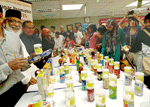
Photo: CAP
|
Visitors at the Penang Hospital learn about good eating habits when they stroll through the healthy lifestyle exhibition organized by the Consumers Association of Penang (CAP) that ends on Friday 20. The event is aimed to raise awareness on the consumption of foods rich in sugar, fat, salt and chemicals that led to obesity among Malaysians. Some worrying trends: Malaysians are the eight highest sugar users in the world, they are getting used to keep awake till late and meat is fast becoming a staple food.
|
Published on Fri, 2012-06-08 11:17

Mohammed Idris lead a protest
in Penang. (Photo: CAP)
|
The Consumers Association of Penang (CAP) and Sahabat Alam Malaysia (SAM) warned that the beauty of this Malaysian state natural environment is slowly losing its shine due to the rapid pace of unsustainable development.
|
Published on Wed, 2012-03-21 08:30
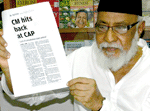
Mohamed Idris. (Photo: CAP)
|
The Consumers Association of Penang (CAP, a member of the Malaysian Social Watch coalition) is complaining on the lack of public consultation by the Penang state government regarding several mega projects that include the construction of a 6.5 km undersea tunnel, a 12 km road and two bypasses of more than 4.0 km.
|
Published on Thu, 2012-03-15 11:07
In terms of gender equity Malaysia is in the very bottom of the East Asia & the Pacific region.
This is made apparent by the publication of the Gender Equity Index (GEI) 2012, published by Social Watch on the eve of Women’s International Day, March 8.
|
Published on Wed, 2012-02-15 07:36

Photo: gromgull/Flickr/CC
|
Penang-based Consumers Association of Penang has urged the Domestic Trade, Co-operatives and Consumerism ministry to immediately enforce the Price Control and Anti-Profiteering Act 2010 on eateries charging excessively for plain water.
|
Published on Thu, 2012-01-26 07:45

CAP president S.M. Mohamed Idris
showing a huge gourd.
(Source: New Strait Times)
|
Do you want to know the secret of growing big and healthy vegetables without a drop of chemical fertiliser? The Consumers Association of Penang's (CAP, one of the focal points of Social Watch in Malaysia) teaches you how to do it at its organic garden on Jalan Mesjid Negeri.
Using its own vermicompost and fertilisers, CAP has produced bottle gourds weighing 4kg and measuring 46cm within 40 days. "Panchakavya organic growth promoters and earthworm fertilisers were used to grow these bottle gourds," said CAP education officer N.V. Subbarow.
|
Published on Tue, 2012-01-10 14:08

Begining of the works for the installation
fo a APR1400 nuclear reactor near Busan
Republic of Korea. It's the same kind of
non tested device that Malaysian government
plans to buy, according to Korean activists
(Photo: KEPCO)
|
The government of Malaysia continues studying the introduction of nuclear energy, in spite of the warnings launched by 14 national civil society groups and others from Korea, Australia and specially Japan after the Fukushima tragedy. An alliance formed by groups of nearby countries, along with three based in Malaysia --the Third World Network and the Consumers Association of Penang (member of Social Watch) and the national chapter of Friends of the Earth International--, called on the Prime Minister Najib Tun Razak’s government to stop its nuclear power development plan.
|
Published on Thu, 2011-05-12 07:16
Source: The Star
The Consumers Association of Penang (CAP, a national focal point of Social Watch) revealed that Malaysian households are spending about half of their income to pay off their debts, reported journalist Josephine Jalleh in a report published by The Star daily journal.
|
SUSCRIBE TO OUR NEWSLETTER
Submit
|






